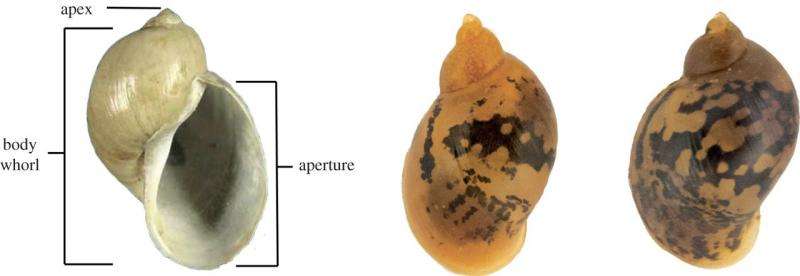April 22, 2015 report
Boldness in individuals linked with shell shape protectiveness in pond snails

(Phys.org)—A team of researchers affiliated with Lund University in Sweden has found that "bolder" snails from a local pond tended to have stronger, more protective shells than their meeker peers. In their paper published in Royal Society Biology Letters, the team describes how they raised snails, measured them and also tested for boldness, and what their findings may mean for the phenotypic compensation' hypothesis.
The researchers note that in recent years, evidence has been piling up of examples of personality differences between members of groups of all manner of different types of creatures, but to date, little is known about how individual differences are maintained over evolutionary time periods. To learn more about that, the team retrieved snail eggs from a local pond and succeeded in raising 160 of them to adulthood.
At three months of age, the snails were tested for their degree of boldness, which was characterized as how much time it took an individual to poke its head out of its shell after being frightened—bold snails took only ten seconds or so, while their more timid peers took 15 or more seconds. Next the researchers measured several aspects of the snail shells, which are believed to be factors related to how resistant they are to cracking due to predator attacks. They found what appeared to be a correlation between boldness and shell protectiveness—those snails that were bolder had more protective shells.
Not surprisingly, those same snails were found to be more resilient against attacks by predatory fish. The researchers claim that their findings suggest the riskier behavior exhibited by the bolder snails may have led to the evolutionary development of a stronger shell, which supports the phenotypic compensation' hypothesis and offers new evolutionary information on how personality traits may be passed down through successive generations.
Of course, it could be the other way around, the team readily acknowledges, those snails born with stronger shells might behave more boldly because they feel more secure in fending off attacks, noting that similar behavior has been noted by other researchers studying hermit crabs—where those with better camouflage showed more boldness.
More information: Individual boldness is linked to protective shell shape in aquatic snails, Biology Letters, rsbl.royalsocietypublishing.or … .1098/rsbl.2015.0029
Abstract
The existence of consistent individual differences in behaviour ('animal personality') has been well documented in recent years. However, how such individual variation in behaviour is maintained over evolutionary time is an ongoing conundrum. A well-studied axis of animal personality is individual variation along a bold–shy continuum, where individuals differ consistently in their propensity to take risks. A predation-risk cost to boldness is often assumed, but also that the reproductive benefits associated with boldness lead to equivalent fitness outcomes between bold and shy individuals over a lifetime. However, an alternative or complementary explanation may be that bold individuals phenotypically compensate for their risky lifestyle to reduce predation costs, for instance by investing in more pronounced morphological defences. Here, we investigate the 'phenotypic compensation' hypothesis, i.e. that bold individuals exhibit more pronounced anti-predator defences than shy individuals, by relating shell shape in the aquatic snail Radix balthica to an index of individual boldness. Our analyses find a strong relationship between risk-taking propensity and shell shape in this species, with bolder individuals exhibiting a more defended shell shape than shy individuals. We suggest that this supports the 'phenotypic compensation' hypothesis and sheds light on a previously poorly studied mechanism to promote the maintenance of personality variation among animals.
Journal information: Biology Letters
© 2015 Phys.org




















